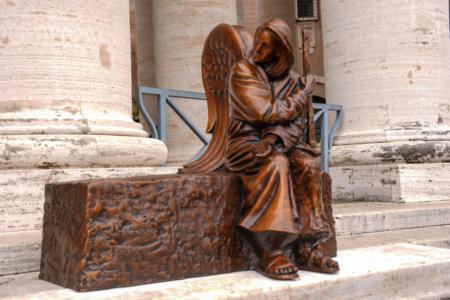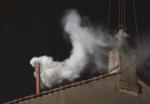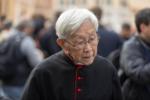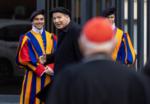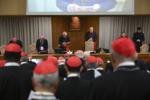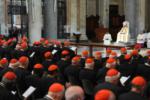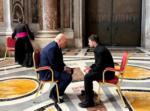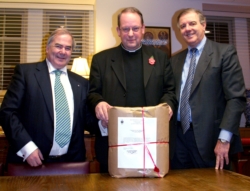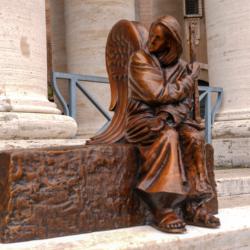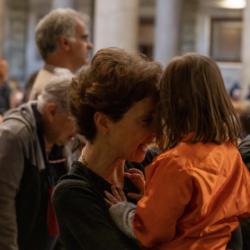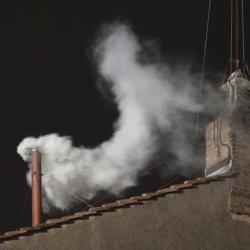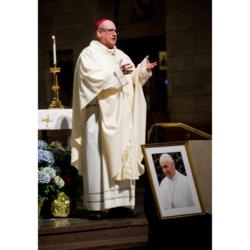Evidence of alleged cure credited to Cardinal Newman sent to Vatican
BOSTON (CNS) -- Evidence of an alleged miraculous cure in the Archdiocese of Boston attributed to the intercession of Cardinal John Henry Newman has been sent to the Congregation for Saints’ Causes in Rome.
The Roman postulator of the cause, Andrea Ambrosi, was assigned by the archdiocesan tribunal in Boston to be the official carrier of the package of documents, which contained two copies of the evidence. He flew from Boston to Rome and handed over the package Nov. 14 to congregation officials at the Vatican.
The package, containing the sworn testimonies and the medical evidence of the healing of Deacon Jack Sullivan, 68, of Marshfield, was sealed during the closing session of the tribunal Nov. 9. Deacon Sullivan had a severe spinal disorder, but was restored to full mobility in 2001 after praying for Cardinal Newman’s intercession.
The package was wrapped in brown paper, tied with red ribbon and secured with the wax seal of Cardinal Seán P. O’Malley of Boston.
Cardinal Newman’s canonization cause was opened in 1958 in Birmingham, England, his home diocese, and in 1987 was introduced in Rome. One reason for the long preparation was the amount of evidence to be collected and studied. In addition to his published works, some 20,000 letters written by the cardinal have survived.
In 1991 the Vatican declared that the English philosopher, theologian and spiritual writer had lived a life of “heroic virtue” which was worthy of imitation, giving him the title “Venerable.”
The Boston tribunal’s final session, which was closed to the public, took place at the tribunal office, located in the Convent of St. Teresa of Avila, in the Boston suburb of West Roxbury.
Those present at the meeting included Auxiliary Bishop Walter J. Edyvean of Boston, representing Cardinal O’Malley; Msgr. Mark Mahoney, judicial vicar of the archdiocese; and other tribunal members.
Bishop Edyvean also represented Cardinal O’Malley at the tribunal’s opening session June 25, 2005.
Also present for the closing session were Ambrosi and Father Paul Chavasse, provost of the Birmingham Oratory -- which was founded by Cardinal Newman in 1848 -- in his capacity as “actor causae” (actor of the cause) for the beatification and canonization of Cardinal Newman. The actor of the cause has overall responsibility for introducing and overseeing its progress.
The session consisted of the signing and the sealing of the documents, a third copy of which has been retained in the archdiocese’s archives.
“In his own day Cardinal Newman was a great defender of the Catholic Church and the papacy, and his life and writings are increasingly seen as of enormous significance for the mission of the universal Church today,” said Father Chavasse.
“It was very moving to be privileged to actually seal the package of documents with the hot red wax and so witness the ending of this particular chapter in the history of the cause,” he added.
Cardinal Newman, who died Aug. 11, 1890, at the age of 89, was an Anglican priest and a leading intellectual in the Church of England before he converted to Catholicism in 1845. He was ordained two years later and was still a priest when he was made a cardinal by Pope Leo XIII in 1879.
Cardinal Newman, prolific as a poet, essayist and novelist, and renowned as a preacher, was best known as a theologian. He made important original contributions in the development of doctrine, in the role of people’s belief in discerning truths of faith and in a carefully-nuanced understanding of papal infallibility.
The cardinal is frequently referred to as the missing father of the Second Vatican Council because his teachings on the laity and doctrine had an influence on those proceedings, some 70 years after his death.
Catholic scholars today have ranked the cardinal’s “Apologia Pro Vita Sua,” written in defense of his conversion to Catholicism, as one of the great spiritual autobiographies of Christian history. His writings on education influenced a generation of U.S. educators, and Newman campus ministry centers at colleges nationwide are named for him.
In general, the Church must confirm two miracles through the intercession of the sainthood candidate before canonization.
